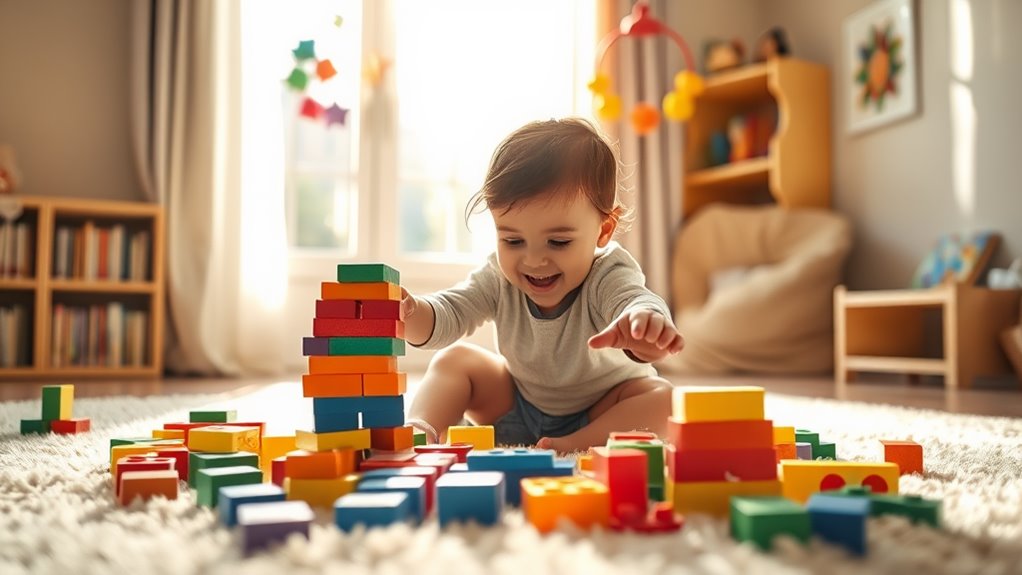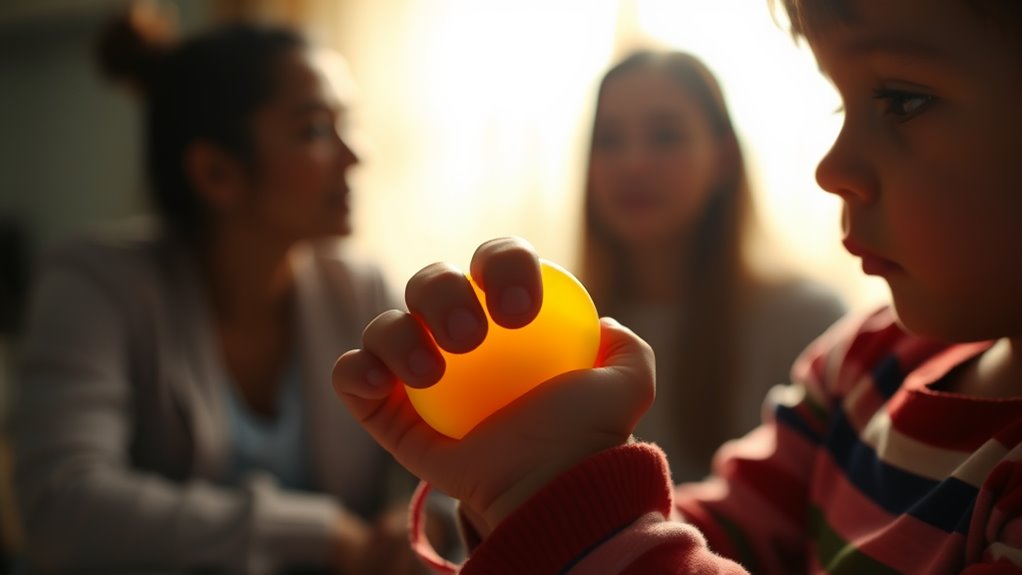5 Simple Activities That Boost Early Brain Development
You can significantly boost early brain development with five simple activities. Start by reading aloud together; it enhances vocabulary and fosters a love for stories. Next, engage in sensory play, which stimulates exploration and imagination. Try simple puzzles and games to develop problem-solving skills and confidence. Incorporate music and movement to build motor skills and creativity as you dance and sing. Lastly, get outdoors for nature experiences that spark curiosity and support emotional well-being. These engaging activities will lay a strong foundation for your child’s brain development, and there’s even more to discover if you keep exploring.
Key Takeaways
- Engage in reading aloud together to enhance vocabulary and critical thinking while fostering a strong bond.
- Incorporate sensory play activities to stimulate exploration and promote fine motor skills through hands-on experiences.
- Utilize simple puzzles and games to encourage pattern recognition, problem-solving, and resilience in children.
- Explore music and movement activities to develop motor skills and boost creativity through dynamic engagement.
- Organize outdoor nature experiences to stimulate curiosity, enhance observation skills, and support emotional well-being.
Reading Aloud Together
Reading aloud together is a wonderful way to foster early brain development in children. When you share stories, you’re not just reading words; you’re creating a special bonding experience that enhances story engagement. As you turn the pages and express different characters, your child’s imagination comes alive, helping them connect with the narrative on a deeper level.
This interaction not only keeps them captivated but also encourages them to ask questions and share their thoughts, further enriching the experience. Moreover, reading aloud is a fantastic tool for vocabulary expansion. You introduce new words in context, making it easier for your child to understand and remember them.
Choose a variety of books, from classics to contemporary stories, to expose your child to diverse language styles and themes. As you discuss what’s happening in the story, you’re paving the way for critical thinking skills.
Sensory Play Activities
Sensory play activities are essential for stimulating your child’s brain development and enhancing their learning experiences. These activities engage multiple senses, helping your child explore the world around them while building crucial cognitive skills.
One effective way to incorporate sensory play is through sensory bins. You can fill these bins with various materials like rice, beans, or sand, allowing your child to dig, pour, and sift. This hands-on experience promotes fine motor skills and encourages imaginative play.
Don’t forget to add small toys or tools to enhance the exploration.
Texture exploration is another vital aspect of sensory play. You can create a texture board by attaching different materials like fabric, paper, and natural elements for your child to touch and feel.
This activity not only supports sensory development but also helps your child learn to identify and categorize different textures.
Simple Puzzles and Games
Engaging your child in simple puzzles and games can be a fantastic way to further enhance their brain development after sensory play activities. These activities encourage pattern recognition, helping your child identify shapes, colors, and sequences.
As they fit pieces together or match cards, they’re not only having fun but also developing essential cognitive skills. Puzzles and games require your child to think critically and engage in problem solving.
When they face a challenge, like figuring out where a piece fits, they learn to approach problems systematically. This not only boosts their confidence but also fosters resilience as they try different strategies until they succeed.
Incorporate a variety of puzzles, such as jigsaw puzzles, shape sorters, or matching games, to keep things interesting. You can also play simple board games that involve counting or taking turns.
These activities are excellent opportunities for you to bond while stimulating your child’s brain.
Music and Movement Exploration
Music and movement exploration can really kickstart your child’s brain development in fun and dynamic ways. Engaging your little one in activities like dance parties not only gets them moving but also helps build their motor skills. When children dance, they learn to coordinate their movements and develop spatial awareness, all while having a blast.
You can also introduce rhythm games to enhance their auditory skills. Clapping to a beat or tapping their feet encourages them to recognize patterns and improve their timing. These activities foster cognitive development, as your child learns to listen and respond to music. Plus, it’s a great way for you to bond and create lasting memories together.
Don’t worry about perfection; the goal is to encourage creativity and self-expression. Let your child choose their favorite songs and explore different dance styles, or even make up your own rhythm games.
Outdoor Nature Experiences
Exploring the great outdoors offers countless opportunities for your child’s brain development. Engaging with nature stimulates curiosity and promotes cognitive skills.
One fun way to do this is through a nature scavenger hunt. Create a list of items your child can find, like different leaves, rocks, or flowers. This activity not only encourages observation but also enhances problem-solving skills as they search for specific items.
Outdoor storytelling is another fantastic way to boost brain development. While you’re in a natural setting, encourage your child to create stories based on their surroundings. Ask them to describe what they see and invent tales about the animals or plants they encounter. This nurtures creativity and language skills, allowing them to express their thoughts.
Additionally, spending time in nature can improve emotional well-being, helping your child learn to manage feelings and build resilience.
Frequently Asked Questions
How Much Time Should I Spend on These Activities Daily?
You’re balancing daily routines, weaving in activities like reading, playing, and exploring. Aim for about 30 minutes a day, mixing it up, keeping it fun, and engaging. It’ll make a world of difference!
At What Age Should I Start These Brain Development Activities?
You can start engaging in age-appropriate activities as early as infancy. Focus on developmental milestones to guide your choices, ensuring the activities match your child’s age and interests for optimal brain development and learning.
What Materials Are Needed for Sensory Play?
Did you know that sensory play can enhance brain connections significantly? For sensory bins, you’ll need materials like rice, beans, sand, or water for texture exploration—perfect for sparking curiosity and creativity in little ones!
Are There Any Screen Time Recommendations for Young Children?
When considering screen time guidelines for young children, it’s crucial to limit exposure. Too much screen time can negatively affect developmental impacts, including attention span and social skills, so keep it to a minimum.
How Can I Create a Safe Outdoor Play Environment?
Did you know that 60% of injuries in children occur during outdoor play? To enhance outdoor safety, ensure play equipment is age-appropriate, well-maintained, and your play area is free from hazards like sharp objects or toxic plants.





